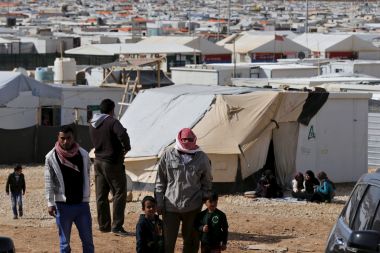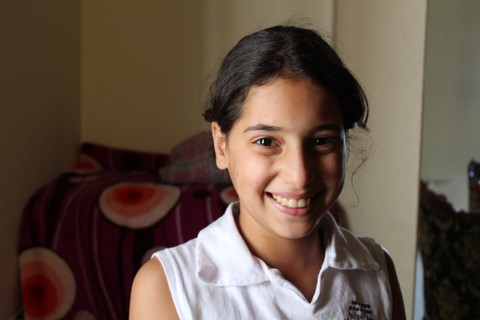Civil war in Syria: Five years on and millions remain in peril
The war in Syria has today entered its sixth year. In half a decade, it has triggered what has been branded the greatest humanitarian crisis of a generation, and the worst refugee crisis since World War II.
Since the outbreak of civil war in 2011, an estimated 11 million Syrians, half its total population, have fled their homes. Around 4.8 million have taken refuge in neighbouring countries such as Lebanon and Jordan or even further afield. The rest have been displaced internally. At least 13.5 million people are in need of humanitarian assistance within Syria itself, and 320,000 people have been killed since the conflict began, including nearly 12,000 children.
Forces loyal to President Bashar al-Assad continue to battle rebels opposed to his rule, in addition to ISIS militants and the al-Qaeda-linked al-Nusra Front. A ceasefire that came into effect on February 26, and that does not even include the latter two groups, is fragile. Daily reports of brutality are still emerging, and no end appears to be in sight. Syria is a country on its knees.
Aid agencies are battling the staggering consequences of a conflict few believed would last this long. A recent report by World Vision estimated that if the war continues for another five years, its true cost will spiral to almost £1 trillion (£1000 billion) in lost growth.
Millions of children will have lost years of access to education and even once a truce is eventually reached, it will take decades for the country to recover.
Peace talks began yesterday in Geneva, the first serious diplomatic intervention since Russia began air strikes in Syria last September, and the atmosphere is already said to be tense. Assad's delegation will not meet with the main opposition alliance face-to-face.
Instead, UN delegates are holding negotiations individually. Neither side has indicated they are prepared to compromise on their position on Assad as remaining president of Syria. The UN envoy to Syria, Staffan de Mistura, has declared the talks a "moment of truth".
But as delegates battle it out in Switzerland, life in the Middle East remains as desperate as ever for millions of civilians caught up in the crisis.
Inside Syria
There are no accurate figures regarding the amount of Syria that is actually controlled by each of the warring groups, though large swathes, including the strategic cities of Aleppo and Raqqa, are under ISIS control, and the Syrian regime has maintained its grip along the Western border.
Christian international development charity Tearfund and its partners are working primarily to give emergency relief within Syria through the distribution of food parcels, blankets and stoves for heating. "There's a physical danger of being there, but also an economic hardship," explained Thomas Stocker, Tearfund's Middle East response manager.
Even relatively well-off families who had savings when war broke out five years ago are now struggling to survive. "Most people have depleted everything, and have had to sell their jewellery to get something to eat," Stocker said. "It's very unfortunate this war has dragged on this long and is still continuing. We hope and pray it ends soon, and peace will come."
Refugees fleeing to Jordan

As millions flee Syria's borders, its neighbours have responded generously. Officially, Jordan has taken in more than 600,000 Syrian refugees, though the true figure is believed to be much higher, probably more than one million, once unregistered people are taken into account. They now make up nearly 20 per cent of the total population, and the country is on the brink of a serious struggle. The influx has caused an immense strain on education, health and other social services, as well as the economy and infrastructure. King Abdullah said last month Jordan was "at boiling point". "Sooner or later, I think, the dam is going to burst," he told the BBC.
Stocker said there is no sign of the crisis abating in Jordan, where he lives with his wife and family. He shared stories of Syrian refugees he has met who have little hope of ever returning home. "It's a very difficult situation, people are stranded and don't know if they can go back, or go somewhere else," Stocker said. "I think many of them would like to go back, but they really don't know if it's possible. There is nobody to predict the future."
The cost to the government in terms of expenditure and infrastructure has been "very heavy", he added. "When the population increases by one million people, it definitely takes a heavy toll on all government systems and structures. That's why his majesty the King has appealed to the international community to increase its support to cope with all these costs."
Moving forward: the international response
In February more than £7 billion was raised at a donor conference for Syria held in London; the largest amount of money ever raised in a single day in response to a humanitarian crisis. Prime Minister David Cameron said the conference received pledges of more than £4.2billion for 2016, and a further £3.5 billion to cover the following four years. "It means millions of people will now receive life-saving food, medical care and shelter in Syria and beyond," Cameron said at the time.
However, more than a month later and that money has "not yet been translated into any real change on the ground," according to Frances Guy, Christian Aid's head of Middle East. She urged all parties involved in the conflict to work towards a peaceful solution and help ensure humanitarian aid reaches those in need. "Shattered lives deserve to hope."
Signs of hope
But despite the brutality of the conflict, there are signs of hope in the Middle East. In Lebanon, which is hosting at least one million refugees from Syria, Pastor Wissam has begun a school for Syrian children, supported by Tearfund. He takes in traumatised children who have missed school as a result of the conflict, and offers lessons centred on ensuring students are shown love, and taught about the importance of reconciliation. "The pupils who have come to the school are not the same pupils as when they came in the beginning," Pastor Wissam said. "The thing that most touches people is: love your enemy. They can see it in us. It's God's work, it's God's hand."

Camille Melki, director of Tearfund's partner organisation Heart4Lebanon, said: "We have a role to set an example for the wider community. In doing so, we can counter prejudicial views and ill-treatment of the refugee population".
"How we treat these refugees is a great testament to God's calling to forgive and care for our neighbour," she added. "The people God places around us are not put there by accident. Our responsibility is to care for the refugees God has put in our midst."
Churches within Syria itself have also become places of refuge in the midst of crisis. Speaking to Christian Today earlier this month, Pastor Edward Awabdeh, who leads the Alliance Church in Damascus and oversees more than 20 churches across Syria, said the Church is "more active than any time before" in the country.
"The Lord is really touching hearts at this time of crisis. People are learning how to come humbly to Him, and we thank God," he said. "It's the time for the Church to stay there and be more active and reach out to people and this gives us joy more than anything else in life."
Raya (name changed) who manages aid distribution through a network of Syrian churches, said they are seen as a place of sanctuary by people suffering the devastating consequences of the war. "Churches are filled in times of disaster, because people are clinging to God," she said. "They need both physical and spiritual support. There is rarely a church not doing this kind of work.
"We are all actively waiting, doing the work, and praying. We are lucky that we have faith that keeps us going. Our hope is in Jesus. I don't know myself how I am still keeping on. We feel that God accompanies us."
Stocker said he's unsurprised that people are turning to faith in their turmoil. "When a country is going through an enormous crisis, people will always ask why this is allowed to happen. And we don't know, but often we see it is a big trigger for change," he said.
"People's lives have been turned upside down and transformed; everything they held on to for security in their lives has been taken away, so many people are turning to God to help and crying out to him to find meaning and comfort."
Syria occupied Lebanon for almost three decades between 1976 and 2005, and the Lebanese people suffered severley under Syrian rule. Now that the country is opening itself up to refugees, it's sending a powerful message, Stocker added.
"For Lebanese churches to reach out to Syrians now has profoundly impacted the people – both Syrian and Lebanese, in terms of reconciliation and showing love and welcoming them into the community," he said.
There is a long way to go, however. Tearfund, along with many other organisations, is calling for a political solution to the conflict, but even if the current talks end in a peace deal, it will be decades before Syria recovers.
"More than a million homes have been completely destroyed, infrastructure has been destroyed, this will require lots of money, time and effort to rebuild the country," Stocker said.
"And to bring reconciliation and healing, to bring peace and forgiveness to the people, this is really where the Church comes in. It will take time; the healing of emotions, of the hurt and the anger... that will take many years."











